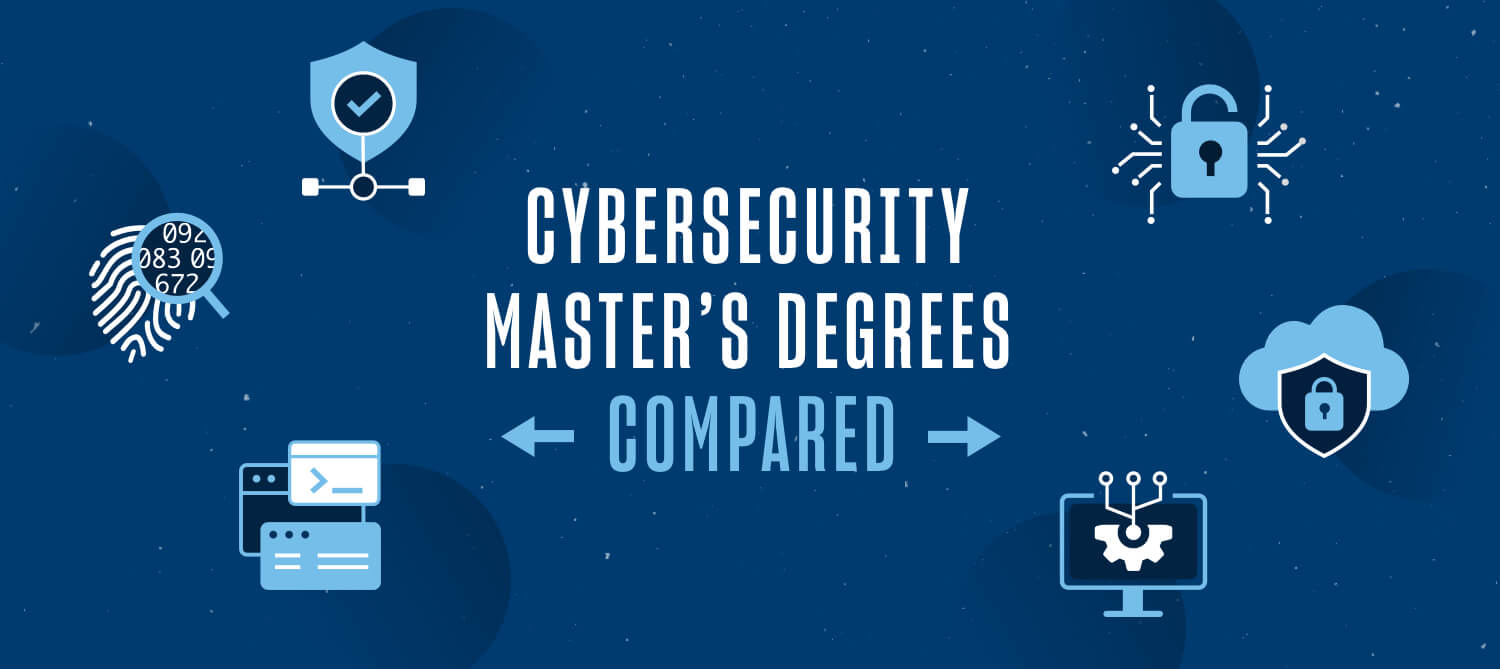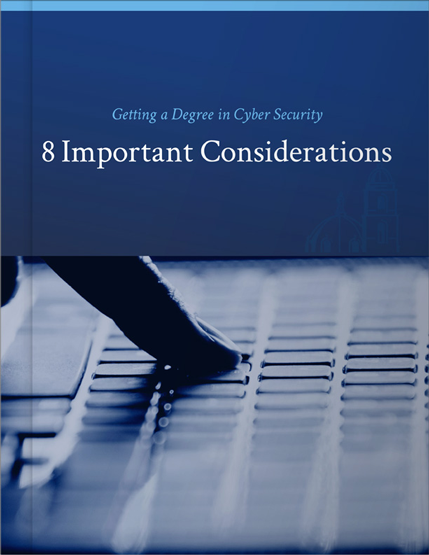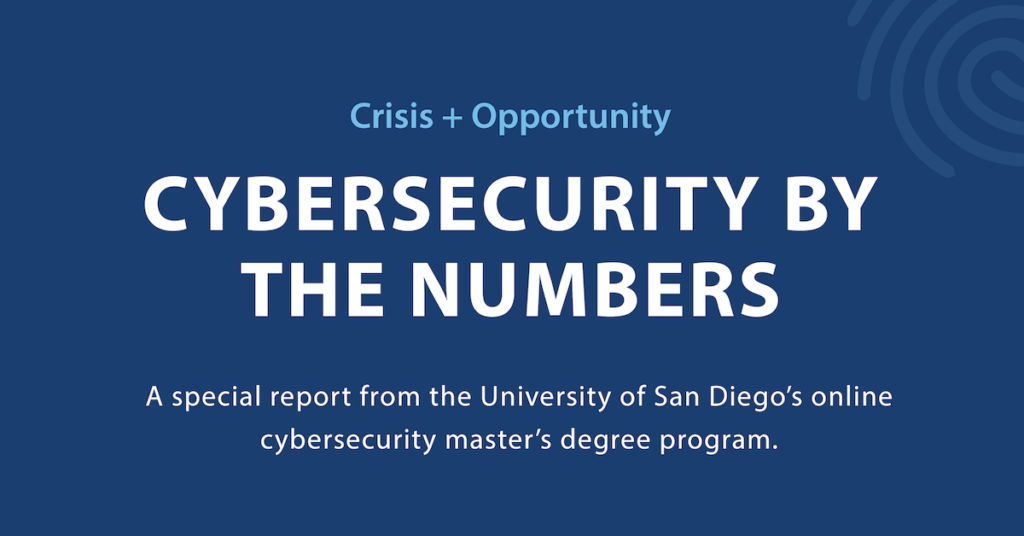Since cybersecurity has grown exponentially over the years, there are now more degree types and specializations within the field — but how do you know which one is right for you? In this guide, we’ll compare a variety of advanced degrees so that you can pursue the right type of higher education for your cybersecurity career goals.
Different Types of Master’s Degrees — M.S. vs. MBA vs. M.P.A.
There are typically three different types of cybersecurity master’s degree programs — master of science (M.S.), master of business administration (MBA) and master of professional studies (M.P.S.).
- M.S. degree programs usually include science, engineering, technology, math, business, medicine, psychology and sociology. As Indeed explains: “M.S. degree programs provide advanced studies in the student’s chosen subject or discipline and generally include writing a thesis or completing a significant research project in order to graduate.”
- An MBA provides a business-centric overview across many different sub-categories, including finance, marketing, statistics and more. Many programs allow students to choose a concentration such as operations management, computer science, marketing or economics.
- An M.P.S. degree “offers practical as well as conceptual education and training for students looking to advance in a particular field.” One of the distinct aspects of M.P.S. programs is their flexibility; these degrees often allow students to tailor their coursework according to their interests and career goals. The programs are usually interdisciplinary, fostering the development of leadership and management skills alongside technical competencies.
M.P.S. and M.S. programs are similar, but a master of professional studies typically focuses on interdisciplinary areas with applied science and math, emphasizing a practice-based curriculum and particular industry skills. Master of science programs are more specialized and inclined toward theory, involving a deeper exploration of research within a particular field.
Different Types of Cybersecurity Master’s Degrees
Now that we’ve explained the similarities and differences between the three main types of degrees, let’s explore the types of available cybersecurity master’s degrees.
- A Master’s in Cybersecurity prepares professionals for an upper-level position in cybersecurity or a related field. The curriculum typically includes the fundamentals of cybersecurity and programming basics. Additional topics may include software security, network security and cryptography. Related degrees may include a Master’s in Cybersecurity Risk Management and a Master of Science in Cyber Security Operations and Leadership.
- A Master’s in Computer Science is geared toward computer scientists and engineers, focusing on topics such as software development, algorithms and computer language theory. This type of degree is ideal for those interested in information systems, video game development, cloud computing and IT security.
- A Master’s in Computer Engineering can prepare graduates for a management position or high-level job working with hardware or software engineering, data analytics, electronics and more.
- For those interested in starting or advancing a career working with data science, engineering or other specialized technological areas, consider a Master’s in Information Technology. Topics typically include software processes, project management, engineering practice, data science and Internet of Things (IoT).
- A Master’s in Information Assurance equips students with the skills to protect online data. Common job titles include information security analyst, computer network architect and computer and information systems manager.
- Network security is defined as “the process of taking physical and software preventative measures to protect the underlying networking infrastructure from unauthorized access, misuse, malfunction, modification, destruction, or improper disclosure, thereby creating a secure platform for computers, users and programs to perform their permitted critical functions within a secure environment.” A Master’s in Network Security can help network security specialists increase their earning potential.
- A Master’s in Information Systems Security will prepare professionals with the skills to implement firewalls, security software and other preventative security tools across a network.
- An MBA in Information Security prepares professionals with an advanced knowledge in cybersecurity prevention and management.
- For those who are interested in both cybersecurity and engineering, consider a Master of Science in Cyber Security Engineering, which provides essential knowledge and skills training for information security practitioners (public or private) who work to ensure the safety and prosperity of companies, communities and the nation.
- A Master of Professional Studies in Cybersecurity may span both technical and non-technical aspects, covering a broad array of topics such as network management and cybersecurity analytics. This balance of theory and practice reflects the overall aim of M.P.S. programs: to equip students with the practical skills and adaptable knowledge necessary for progression and innovation within their chosen field.
[RELATED] Which Cyber Security Program is Right For You? Download our free infographic to help decide >>
Cybersecurity Masters Degree Specializations
In addition to numerous types of advanced cybersecurity degrees, there are also options for concentrations, which may be beneficial if you are looking to advance within a specialized field. Some of the most common include:
- Computer Science
- Computer Engineering
- Information Technology
- Information Assurance
- Network Security
- Information Systems Security
- Cybercrime and Fraud Investigation
- Digital Forensics
- Cloud Security
6 Tips for Choosing the Right Degree Program & Specialization
With all the available options, selecting the right degree program and specialization may seem overwhelming, but here are some helpful tips to keep in mind:
- Make sure the degree and program align with your career goals. Are you looking for a general type of cybersecurity degree or a certain specialization? If you aren’t sure exactly what type of position is the right fit, opt for a broader degree, which can set you up for success in a variety of careers.
- Keep time commitment in mind. Programs are either 100% online, in-person on campus, hybrid, part-time or full-time. Which combination works for your lifestyle?
- Consider the department and program reputation. Is the college or university accredited and nationally recognized?
- Explore the curriculum. Take a look at the course descriptions and skills being taught to ensure the curriculum aligns with your expectations and goals.
- Talk to current and former students. What better way to evaluate a program than to speak with those who are in it? An enrollment advisor should be able to put you in touch with either a current student or an alum.
- Look for a program with skilled faculty/instructors who have extensive experience. Don’t be afraid to email faculty members to set up a quick chat or ask a few questions. They should be more than happy to provide you with more information about their program.
Elevate Your Cybersecurity Career with USD
As you explore master’s degree in cybersecurity, we hope you consider two programs offered by the University of San Diego.
The 100% online Master of Science in Cyber Security Operations and Leadership program is designed for career-focused professionals who are interested in gaining a deeper understanding of cybersecurity concepts, topics and theories, along with leadership skills. Students will gain specific knowledge and skills in the areas of technology, law, policy, compliance, governance, intelligence, incident response and management.
USD’s Master of Science in Cyber Security Engineering has been designated as a National Center of Academic Excellence in Cybersecurity. Each CAE-designated program equips students with the necessary skills, knowledge and tools to succeed in cybersecurity.
USD’s Master of Science in Cyber Security Engineering, which is offered both on-campus and online, is ideal for recent graduates and skilled professionals with an engineering background who are currently working in a wide range of cybersecurity roles or aspiring to work as security engineers.
Looking for more information? Download our free eBook — Getting a Degree in Cyber Security: 8 Important Considerations.





